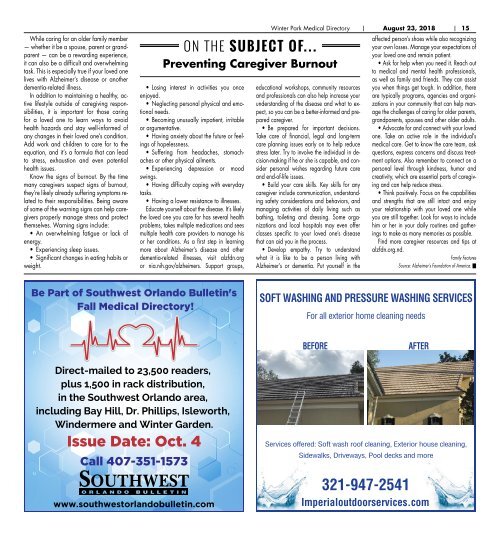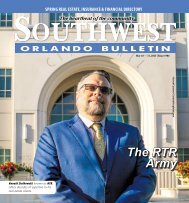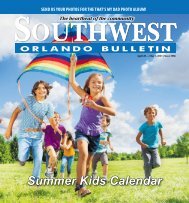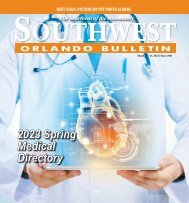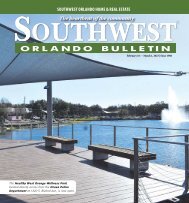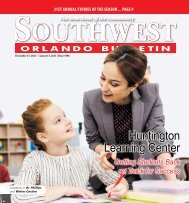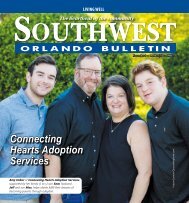082318 WPMD DIGITAL EDITION
Create successful ePaper yourself
Turn your PDF publications into a flip-book with our unique Google optimized e-Paper software.
While caring for an older family member<br />
— whether it be a spouse, parent or grandparent<br />
— can be a rewarding experience,<br />
it can also be a difficult and overwhelming<br />
task. This is especially true if your loved one<br />
lives with Alzheimer’s disease or another<br />
dementia-related illness.<br />
In addition to maintaining a healthy, active<br />
lifestyle outside of caregiving responsibilities,<br />
it is important for those caring<br />
for a loved one to learn ways to avoid<br />
health hazards and stay well-informed of<br />
any changes in their loved one’s condition.<br />
Add work and children to care for to the<br />
equation, and it’s a formula that can lead<br />
to stress, exhaustion and even potential<br />
health issues.<br />
Know the signs of burnout. By the time<br />
many caregivers suspect signs of burnout,<br />
they’re likely already suffering symptoms related<br />
to their responsibilities. Being aware<br />
of some of the warning signs can help caregivers<br />
properly manage stress and protect<br />
themselves. Warning signs include:<br />
• An overwhelming fatigue or lack of<br />
energy.<br />
• Experiencing sleep issues.<br />
• Significant changes in eating habits or<br />
weight.<br />
ON THE<br />
• Losing interest in activities you once<br />
enjoyed.<br />
• Neglecting personal physical and emotional<br />
needs.<br />
• Becoming unusually impatient, irritable<br />
or argumentative.<br />
• Having anxiety about the future or feelings<br />
of hopelessness.<br />
• Suffering from headaches, stomachaches<br />
or other physical ailments.<br />
• Experiencing depression or mood<br />
swings.<br />
• Having difficulty coping with everyday<br />
tasks.<br />
• Having a lower resistance to illnesses.<br />
Educate yourself about the disease. It’s likely<br />
the loved one you care for has several health<br />
problems, takes multiple medications and sees<br />
multiple health care providers to manage his<br />
or her conditions. As a first step in learning<br />
more about Alzheimer’s disease and other<br />
dementia-related illnesses, visit alzfdn.org<br />
or nia.nih.gov/alzheimers. Support groups,<br />
Winter Park Medical Directory x August 23, 2018 x 15<br />
SUBJECT OF...<br />
Preventing Caregiver Burnout<br />
educational workshops, community resources<br />
and professionals can also help increase your<br />
understanding of the disease and what to expect,<br />
so you can be a better-informed and prepared<br />
caregiver.<br />
• Be prepared for important decisions.<br />
Take care of financial, legal and long-term<br />
care planning issues early on to help reduce<br />
stress later. Try to involve the individual in decision-making<br />
if he or she is capable, and consider<br />
personal wishes regarding future care<br />
and end-of-life issues.<br />
• Build your care skills. Key skills for any<br />
caregiver include communication, understanding<br />
safety considerations and behaviors, and<br />
managing activities of daily living such as<br />
bathing, toileting and dressing. Some organizations<br />
and local hospitals may even offer<br />
classes specific to your loved one’s disease<br />
that can aid you in the process.<br />
• Develop empathy. Try to understand<br />
what it is like to be a person living with<br />
Alzheimer’s or dementia. Put yourself in the<br />
affected person’s shoes while also recognizing<br />
your own losses. Manage your expectations of<br />
your loved one and remain patient.<br />
• Ask for help when you need it. Reach out<br />
to medical and mental health professionals,<br />
as well as family and friends. They can assist<br />
you when things get tough. In addition, there<br />
are typically programs, agencies and organizations<br />
in your community that can help manage<br />
the challenges of caring for older parents,<br />
grandparents, spouses and other older adults.<br />
• Advocate for and connect with your loved<br />
one. Take an active role in the individual’s<br />
medical care. Get to know the care team, ask<br />
questions, express concerns and discuss treatment<br />
options. Also remember to connect on a<br />
personal level through kindness, humor and<br />
creativity, which are essential parts of caregiving<br />
and can help reduce stress.<br />
• Think positively. Focus on the capabilities<br />
and strengths that are still intact and enjoy<br />
your relationship with your loved one while<br />
you are still together. Look for ways to include<br />
him or her in your daily routines and gatherings<br />
to make as many memories as possible.<br />
Find more caregiver resources and tips at<br />
alzfdn.org.nd.<br />
Family Features<br />
Source: Alzheimer’s Foundation of America. n<br />
Be Part of Southwest Orlando Bulletin's<br />
Fall Medical Directory!<br />
SOFT WASHING AND PRESSURE WASHING SERVICES<br />
For all exterior home cleaning needs<br />
BEFORE<br />
AFTER<br />
Direct-mailed to 23,500 readers,<br />
plus 1,500 in rack distribution,<br />
in the Southwest Orlando area,<br />
including Bay Hill, Dr. Phillips, Isleworth,<br />
Windermere and Winter Garden.<br />
Issue Date: Oct. 4<br />
Call 407-351-1573<br />
www.southwestorlandobulletin.com<br />
Services offered: Soft wash roof cleaning, Exterior house cleaning,<br />
Sidewalks, Driveways, Pool decks and more<br />
321-947-2541<br />
Imperialoutdoorservices.com


